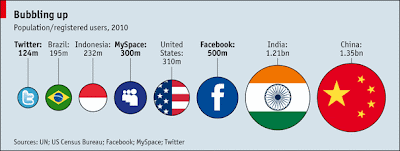WHEN, in 2001, Goldman Sachs dreamt up the acronym BRICs for the largest emerging economies, the country that most people said did not belong in the group was Brazil. Today, the leading candidate for exclusion is Russia. But some prominent observers are still sceptical about Brazil’s prospects. A notable example is Martin Wolf, the chief economics commentator of the Financial Times, who recently (and very reasonably) pointed out that Brazil’s share of world output has actually fallen over the past 15 years, from 3.1% in 1995 to 2.9% in 2009 at purchasing-power parity. “Brazil cannot become as big a player in the world as the two Asian giants”, China and India, Mr Wolf concludes.
.jpg)
At a recent meeting with a group of investors in Hong Kong, Rubens Ricupero offered an intriguing counterargument. A long-serving and respected Brazilian diplomat, Mr Ricupero was the secretary-general of the United Nations Conference on Trade and Development from 1995 to 2004. Although he has links to the opposition to Brazil’s ruling Workers’ Party—he previously served as finance minister in the government of a rival party—his analysis is not party-political. “For the first time in its history,” he argues, Brazil is enjoying “propitious conditions in four areas that used to pose serious limitations to growth.” They are:
Commodities. Commodity production used to be regarded as either a curse or, at best, something countries ought to diversify away from as quickly as possible (which Brazil itself did in the 1970s). But over the next fifty years, Mr Ricupero notes, half the expected increase in the world population will come from eight countries, of which only one—America—is not sucking in commodities at an exponential rate of increase. The others are China, India, Pakistan, Nigeria, Bangladesh, Ethiopia and Congo. China alone will account for 40% of the additional demand for meat worldwide, he points out. This demand will remain strong partly because of rising population and partly because of urbanisation, which increases demand for industrial commodities (like iron ore to make steel) and meat (because urbanisation changes eating habits). Brazil is already a large iron-ore producer, and has transformed itself into an agricultural powerhouse over the past 10 years, becoming the first tropical country to join the ranks of the dominant temperate-climate food exporters such as America and the European Union. It is well-placed to benefit from the emerging markets’ commodity boom.
.jpg)
Petroleum. Mr Ricupero argues that the success of the Brazilian state oil company, Petrobras, in offshore oil exploration has transformed Brazilian energy. “Although no precise and final estimates can be made yet of the [so-called] pre-salt oil reserves potential of the Santos Basin,” he says, “all serious indications point to the high likelihood that Brazil is poised to become at least a medium-sized net oil-exporting country.” New oil and gas deposits far away from the volatile Middle East should increase Brazil’s strategic importance, as well as improving its balance-of-payments position.
Demography. Brazil is reaping a big demographic dividend. In 1964, its fertility rate (the average number of children a woman can expect to have during her lifetime) was 6.2. It fell to 2.5 in 1996, and is now below replacement level, at 1.8, one of the sharpest drops in the world. The result has been a collapse in the dependency ratio—the number of children and old people dependent on each working-age adult. As recently as the 1990s, that ratio was 90 to 100 (ie, there were 90 dependents, mostly children, for each for every 100 Brazilians of working age). It is now 48 to 100. Thanks to this, Brazil no longer has to build schools, hospitals, universities and other social institutions helter-skelter to keep pace with population growth. Eventually, the ratio will creep back up as today’s workforce enters retirement, but such problems remain decades ahead. In the meantime, Brazil can pay more attention to the quality rather than the quantity of its social spending, which should, in theory, improve the population’s education, health, and work skills.
.jpg)
Urbanisation. Urbanisation both encourages economic growth and accompanies it. But it also causes problems. “Many of the worst contemporary problems in Brazil,” Mr Ricupero says, such as “lack of educational and health facilities, poor public transportation, marginalisation and criminality, stem from [an] inability to cope with internal migrations in an orderly and planned way.” That is now changing, he argues. The waves of migrants out of the countryside and into the cities have more or less finished. Brazil is now largely an urban country: about four-fifths of the population lives in cities. “For Brazil,” he concludes, “the period of frantic and chaotic growth of big cities that is now taking place in Asia and Africa is already a thing of the past.”
.jpg)
Mr Ricupero is relatively cautious about the conclusion. “The four sets of conditions outlined above,” he says “are by no means sure guarantees of automatic success.” He admits Brazil has fallen behind in infrastructure, for example, and says that, if it had the sort of infrastructure you see in Costa Rica and Chile (the two best examples in Latin America), economic growth would be about two percentage points higher per year. On the other hand, Brazil also has some other advantages: unlike China, Russia and India, it is at peace with its neighbours (all 10 of them). Whether you think all this really amounts to a rejoinder to Mr Wolf is a matter of doubt. Brazil might still remain a relatively small player in the world. Still Mr Ricupero’s points are, at least, actually happening (not things expected in future), can be measured in concrete terms and are long-term (they should continue for decades). Who knows? Perhaps they might even be right.


.jpg)
.jpg)
.jpg)
.jpg)
.jpg)









